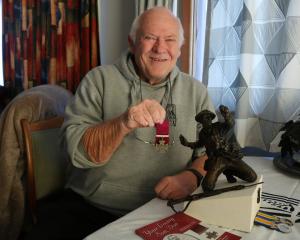To do that, the Friendly Bay Society, which has about 40 members, would need legal assistance from the Ministry for the Environment.
Yesterday, the society was in the Environment Court in Dunedin but, before it even completed its opening legal submissions, withdrew its case.
The society was ordered to pay $3000 in costs to the council, part of an estimated $11,500 in legal fees and unspecified costs for council staff time to prepare for yesterday's court hearing.
After the hearing, society representative Wayne Stringer said the society had "zip finances".
He did not know how it would pay the costs awarded against it.
That, along with whether to go to the High Court, would be decided at the annual meeting some time within the next two weeks.
If the society went to the High Court, it would have to employ legal counsel.
To pay for that, it would apply to the Ministry for the Environment for legal assistance, Mr Stringer said.
The council has allocated $3 million from the 5.84ha, 27-section subdivision on Cape Wanbrow to help pay for the $9.7 million redevelopment of the Opera House in Oamaru.
If the subdivision does not go ahead, ratepayers face making up the shortfall.
Yesterday Judge Jeff Smith, early during the society's sub-missions, ques-tioned whether the Environment Court had jurisdiction over the key issues, particularly whether part of the land was covered by the Reserves Act, if the council could lift that reserve designation, then issue a non-notified resource consent to subdivide the property.
There was no case law to show the Environment Court had jurisdiction over the Reserves Act.
That was an issue for the High Court, along with whether the subdivision was unlawful.
Judge Smith and commissioner Charles Manning then had discussions in chambers with Mr Stringer and council's legal adviser Michael Garbett, after which the society withdrew its application.
Mr Stringer accepted the Environment Court had limited jurisdiction over central issues raised by the society.
Because of the legal argument which would be required on those issues, the society decided to withdraw its application.
Mr Garbett applied for costs on behalf of the council.
He estimated legal fees totalled $11,500, and he also asked for two-thirds of the council's internal costs to prepare for the hearing.
The society never approached the council to discuss its concerns before it filed proceedings with the Environment Court in February.
At an Environment Court prehearing, Judge Jon Jackson had questioned the issue of jurisdiction.
Mr Garbutt said he also discussed that with the society.
"The society boxed on to this hearing, causing the council to prepare and incur costs," he said.
Mr Garbett alleged the society's case was poorly argued and presented, causing frustration for the council.
Mr Stringer opposed costs being award against the society.
The society was small, he believed it was well intentioned and had presented the best evidence possible with limited resources.
In awarding costs, Judge Smith said Oamaru was a close-knit community and some people had very real concerns the council was utilising land shown as reserve.
That had become a wide community issue.
Some people were also frustrated at the lack of notification and transparency, the council's approach to the subdivision causing suspicion.
But, Judge Smith felt the society should make some contribution to the council's costs, awarding $3000 which could be enforced in the Oamaru District Court if necessary.
The society had challenged the legality of the Forrester Heights subdivision and sought declarations from the court on: Whether the council had unencumbered title to the land; Whether the council's procedures were lawful; Whether the Reserves Act and/or a recreational zone applied to the site; Whether trees on the land were protected under the district plan and/or the Reserves Act.












